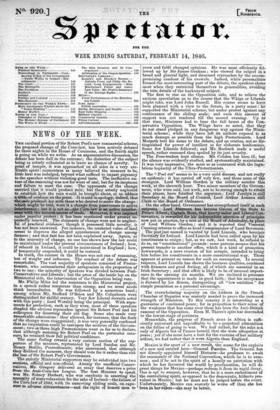NEWS OF THE WEEK.
Tan cardinal portion of Sir Robert Peel's new commercial scheme, the proposed change of the Corn-law, has been actively debated for three nights in the House of Commons, and the fourth night is going on while we write. As an argumentative discussion, the debate has been dull in the extreme; the dialectics of the subject being so utterly exhausted as to leave no chance of novelty. In point of temper, it was approached on all sides in a very cre- ditable spirit : momentous as many believed the measure to be, little heat was indulged, beyond what sufficed to impart piquancy to the speeches without violating good taste. The ineffective na- ture of the reasoning was not for want of zeal, but for its ineptness and failure to meet the case. The opponents of the change asserted that it would produce ruin; but they utterly neglected to establish how the ruin would be brought about, or to adduce a tittle of evidence on the point. It is said in apology, indeed, that the.omms larobafidi lay with those who desired to make the change : which might be true, were it a change from passiveness to active interference ; but it is not so—the Corn-law is an active interfer- ence with the natural course of trade. Moreover, it was imposed under popular protest ; it has been continued under protest re- peatedly renewed. The claimants of change were not so neglect- ful of practical evidence : though it possessed little novelty, it has not been answered. For instance, the unabated value of land seems to disprove the alleged apprehension of change among farmers ; and that fact has not been explained away. Again, as to the necessity of change, no one has shown how the law could be maintained under the present circumstances of Ireland ; how, if relaxed in Ireland, it could be maintained in England ; how, if temporarily suspended, it could be restored.
In truth, the contest in the House was not one of reasoning, but of weight and influence. The conduct of the debate was remarkable. The vast majority of speakers consisted of Protec- tionists, who outnumbered their antagonists in the proportion of two to one : the minority of ipeakers was divided between Peel- Conservatives and Liberals ; but the press of the battle lay on the Ministerial side, the intervention of the Opposition being rare.
Mr. Philip diles led the resistance to the Ministerial project, in a speech rather temperate than strong, and we must needs think inconclusive. He was followed by a numerous band ; among whom Mr. Stafford O'Brien and Mr. Colquhoun were distinguished for skilful oratory. Very few Liberal recruits acted with this party ; Lord Worsley being the principal. With argu- ments for protection, such as they were, most of these speakers coupled the obvious reproaches against Sir Robert Peel and his colleagues for deserting their old flag. Some also made very remarkable admissions : they allowed, for instance, that the fears of the change were exaggerated ; it was very generally confessed that no imputation could be castupon the motives of the Govern- ment; two or three high Protectionists went so far as to declare, that although resisting Sir Robert Peel on the particular 'mea- sure, he retained their full political confidence. The same feeling created a very curious section of the sup- porters of the measure, represented by Lord Sandon and Mr. Henry Baillie, Protectionists; who announced, that although they disliked the measure, they should vote for it rather than risk the loss of Sir Robert Peel's Government.
The strictly Ministerial supporters may be subdivided into two sections, official and non-official. Among the unofficial Conser- vatives, Mr. Gregory delivered an essay that deserves a prize from the Anti-Corn-law League. The first Minister to speak was Mr. Sidney Herbert; who was emphatic in asserting the necessity of some relaxation for the sake of Ireland—the failure of the Corn-law of 1842, with its unmoving sliding scale, on expo- sure to adverse circumstances—and the right of honest men to
avow and fulfil changed opinions. He was most efficiently in up by Sir James Graham ; who viewed the subject n a broad and general light, and disarmed reproaches by the uncom- promising candour of his avowals. Indeed, while personalities formed the most interesting part of the debate, the speakers shone most when they restricted themselves to generalities, avoiding the trite details of the hackneyed subject.
The first to rise on the Opposition side, and to relieve the anxious speculation as to the course that the Whigs or Liberals might take, was Lord John Russell. His course seems to have been planned with a view to the future, in a party sense : he supported the Ministerial scheme, but under protest against any continuance of the sliding scale; and even this amount of support was not tendered till the second evening. Up to that time, Ministers had to bear the full brunt of the Con- servative Opposition. The Whigs have so acted, that they do not stand pledged in any dangerous way against the Minis- terial scheme; while they have cleft its authors exposed to as much damage as possible from the high Protectionists. Lord Morpeth lent his name to the debate, and an oration, not so dis- tinguished for power of intellect as for elaborate bonhominie. Some few Liberals followed; and Mr. Roebuck made a useful speech, rather seasoned than spoiled by its just severity.
The Free-traders kept silence. Mr. Cobden has been ill; but the silence was evidently studied, and systematically maintained. It was very impressive, the more so as contrasted with the lugu- brious loquacity of the Ultra-Protectionists.


























